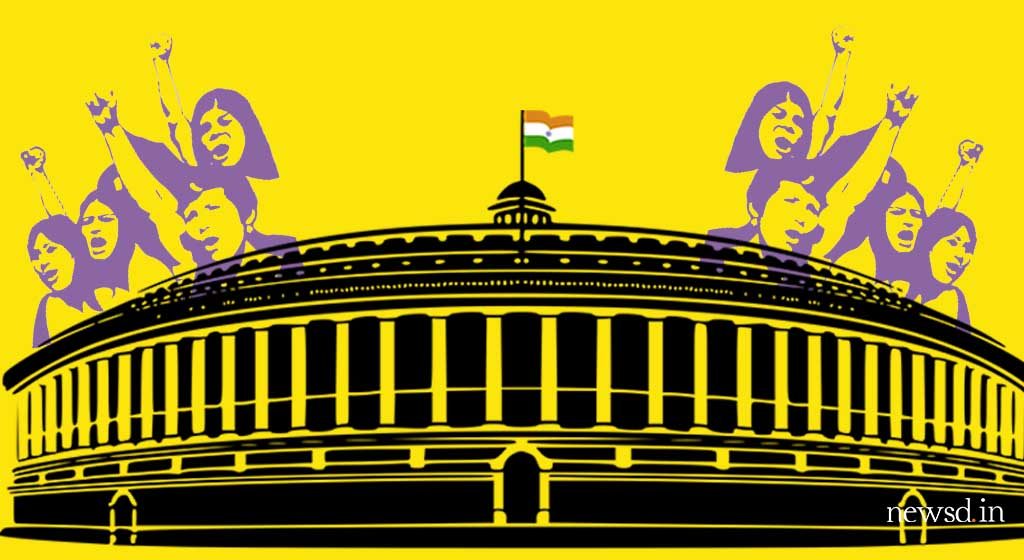From a half won battle of gender equality to a culture that celebrates only the reproductive role of women, India, a nation with over seventy years of democracy and a constitutional guarantee of equality is yet to give to its women freedom in the true sense of the term. But as this democracy gradually strengthens, the past few decades have seen some victories, from child marriage being made illegal to the domestic violence bill to the recent ban on instant Triple Talaq, but the biggest achievement will still be the participation of women in politics. Beginning from the 90s, the 73rd and 74th amendments to the constitution mandated 33 % reservation for women at the level of the Panchayats and the local bodies.
This was a huge step forward. A recent study by the United Nations revealed that the participation of women in politics has a strong positive and socio-economic impact on a country. Indian women, mostly from the disadvantageous groups have taken upon themselves to transform their communities and their villages, and the impact of this, is beginning to be seen.
The increasing participation of women can be called the feminisation of politics, a term that would include various forms and facets of women’s involvement including their representation in political bodies in the country’s politics, as well as their involvement as MPs and MLAs. The report ‘Women in Politics 2017 Map’ published by Inter-Parliamentary Union and UN Women, ranks India 148th globally in terms of women’s representation in executive government and parliament. The participatory increase among women in Lok Sabha elections is complemented by increased participation of women in election campaigns. As voters, women’s participation in the electoral process has steadily increased from 46.6% in 1962 to around 65.6% in 2014.
Constitution of India in the Preamble, promises to secure to all its citizens ‘JUSTICE, social, economic and political’, as well as ‘EQUALITY of status and of opportunity’. The active participation of women in the electoral process is a compelling pointer of the successful expansion of democracy in any country. Furthermore, India has endorsed the ‘International Convention on Elimination of All Forms of Discrimination against Women’ adopted in 1979 by the UN General Assembly which specifies the right for the political participation of women.
The engagement of women in the political process helps strengthen democracies. Male legislators are almost three times as probable as female legislators to have criminal charges pending against them when they stand for election. This aspect can explain about one fourth of the difference in growth between male and female led constituencies. Besides, as seen from the details filed in nomination papers, the rate at which women accumulate assets while in office is ten percentage points lower per year than men.
The presence of women will not lead to better representation of their concerns in policymaking; it is also likely to lead to higher economic growth. In terms of infrastructure development based on the MLAs’ performance in implementation of the Pradhan Mantri Gram Sadak Yojana, it is concluded that women demonstrate higher level of efficacy in terms of achieving the completion of developmental projects in their constituency.
Distinguishing the role of women in decision making process in the society is critical to strengthening women’s agencies for building a progressive society with equality of opportunities among all citizens. There have been proposals for introducing reservation of seats in legislative bodies for women, similar to the ones at the local level.
Improving capacity building, gender training and awareness is also crucial. For example, a new scheme called ‘Nai Roshni’ aims to empower and instill confidence among women from minority, including their neighbours from other communities living in the same village or locality.
Additionally it is important to improve their access to learning and work on gender sensitization of both girls and boys at the school level. However, women’s lack of access to education and to economic and political engagements is often deeply rooted in and hampered by cultural, religious or traditional norms and values. That is to say that merely increasing their participation or representation in the political processes might not be a panacea to all the women related issues as the major chunk of the problems emanate from a bound mindset. Hence, women’s empowerment not only requires socio-political reforms and technical capacity development, but also often requires men and women to change their way of thinking.
The factors that restrict women’s participation in politics and political decision making include domestic responsibilities, the prevailing cultural attitudes regarding the roles of women in society and the deficient, and at times absent support of family restricts the number of women available to participate in the political process. These factors combined with the limited access to education and lack of financial independence weakens the confidence of the women to be a part of the political arena.
The political system has also to be open to women. Political parties and electoral systems, which enhance or limit the ability of men or other groups to promote their own interests, can be crucial factors in allowing women access in equal numbers. Studies have shown that the proportional representation system has been found to increase women’s representation.
Today, as India moves forward, it needs an equal representation of men and women in politics. As the UN asserts, “more women in politics make for stronger democracies.” Gender equality in politics strengthens democratic processes. Women have a propensity to innovate in politics by working across party lines and championing social issues that are often uncared for. Power is real, and if exercised ethically and intelligently it has the capacity to change lives and build just, equitable, and peaceful societies.
Pandita Ramabai: An indomitable voice rebelliously championed for women’s rights
‘Women have to wait 217 years for pay gap to close: World Economic Forum


















